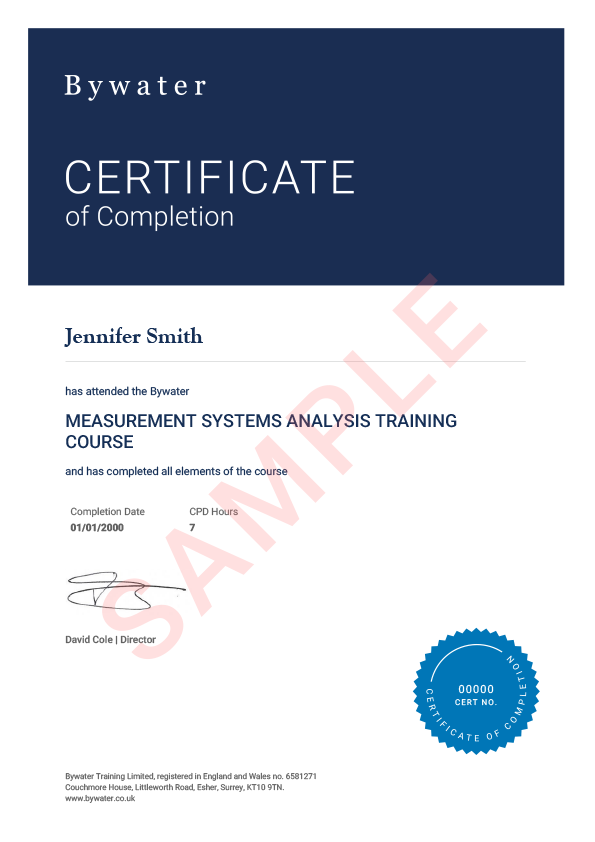Measurement Systems Analysis Training Course
DURATION
1 dayCPD
Equivalent to 7 hoursCERTIFICATES
All delegates will receive a certificate on completion.DELIVERY OPTIONS
Achieve a basic knowledge of the principles of measurement systems analysis (MSA) and an understanding of the importance of MSA techniques on the Measurement Systems Analysis training course.
Delegates will complete the course with a knowledge of the methodologies for performance of measurement systems studies with respect to bias, linearity and stability.
- quality professionals, Six Sigma change agents, Lean practitioners and support staff who require a basic understanding of measurement system evaluation techniques and the potential benefits of understanding measurement system limitations
- personnel with responsibility for design/process engineering who require MSA studies to help them specify tolerances, production processes and acceptance criteria, and need to understand the information when it is presented
- those who are required to support MSA studies, but are not directly responsible for the analysis
- in-house experts who need to plan and execute MSA studies and will become the champions for the appropriate use of MSA to drive continuous improvement and influence senior management
Additional core tools courses include Introduction to APQP and PPAP, Failure Mode and Effects Analysis (FMEA), and Statistical Process Control (SPC).
Book any 2 of these Core Tool training courses and you will receive a discount of £100.
Book our 4-day Core Tools Package training course, providing training on all 5 Core Tools, and save £605 + VAT against the cost of booking the courses separately.
- concepts of MSA
- measurement system elements and their contribution to measurement variation
- terminology and concepts (bias, linearity, stability, repeatability and reproducibility)
- the existence and measurement of variation
- variation
- normal distribution
- accuracy and precision
- measures of variation (mean, standard deviation and variance)
- MSA studies
- bias (overview and methodology)
- linearity (overview and methodology)
- stability studies (overview and methodology)
- measurement uncertainty (overview)
- measurement system analysis and studies (variable and attribute)
- repeatability and reproducibility
- performance of a gauge R&R study
- interpretation and use of study data (from example data provided)
- use of data for cost saving (calibration intervals, number of measurements taken etc.)
- Day 1
- WELCOME AND INTRODUCTIONS
- Module 1 The Need for Measurement Systems Analysis
- Module 2 Measurement Concepts
- Module 3 Variation in the Measurement Process
- Workshop 1 Variation
- Workshop 2 Data Location and Spread
- Module 4 Histograms, Run and Control Charts
- Module 5 The Phases of Measurement Systems Analysis and IATF 16949/APQP
- LUNCH
- Module 6 MSA Studies
- Module 7 R&R Studies
- Module 8 Other Gauge Studies
- Module 9 Improving Measurement Systems
- Review & evaluation
- CLOSE
- use MSA to determine the suitability of measurement systems
- perform a repeatability and reproducibility (R&R) study
- interpret the results in the context of the process variation and product acceptance criteria
- use the data to improve the effectiveness of the measurement system
Delegates who attend and fully participate in the course will receive a certificate of completion, evidencing their new understanding of measurement systems analysis.

Upcoming course dates










Learning about measurement systems analysis will enhance your skills in the application of the Six Sigma approach to business improvement and IATF 16949. These skills are useful to quality professionals, engineering staff, those directly involved in MSA studies, and any other employees who would benefit from a clear understanding of what MSA offers.
By attending this highly practical 1-day course, you will gain an understanding of the value and limitations of MSA and how to use it to assess measurement systems.
The Core Tools training courses offer more detail in specific tools to support product and process development and improvement.
There are 5 Core Tools, covered in 4 courses, and you can book any of the courses in any order. Book 2 together and you will receive a discount, or learn about all 5 tools and you can take advantage of our Core Tools training package for even greater cost effectiveness.
The Core Tools courses are one element of our business improvement training programme, which also covers Lean, Six Sigma, Root Cause Analysis and the EFQM Excellence Model.
Yes, we will send you a certificate of attendance after you have completed the 1-day course. You will be able to share this certificate with colleagues, LinkedIn and any career histories.
The course is equivalent to 7 hours CPD.
We aim to deliver an interactive, practical course that enables delegates to test their new knowledge in the classroom environment, with help from our expert tutor. The goal is to equip attendees with the confidence to employ their new skills at the end of the course.
Feedback from past delegates suggests our tutors are delivering the information people need in the way that works for them. Comments have included:
- ‘The tutor was obviously experienced in real world applications and was clear and concise in her delivery, making it understandable to all levels. It was a good introduction to the subject.’
- ‘The tutor has a wealth of knowledge that easily expands beyond the scope of what was being taught, which helped a lot with specific examples brought to the training.’
- ‘I will be conducting MSA more frequently at work so this has given me a solid foundation to build on.’
- ‘The course has given me a much fuller understanding of the process and its methods. I work in calibration and quality so it will be an ongoing project.’
Customer reviews
Sumika Polymer Compounds (UK) Ltd|9th Jul, 2025
Sumika Polymer Compounds (UK) Ltd|8th Jul, 2025
Technipfmc Umbilicals Ltd|19th May, 2025
Endomagnetics Ltd|16th May, 2025
Incap Electronics UK Ltd|14th May, 2025
Cummins Inc|28th Apr, 2025
Sumitomo Electric Wiring Systems (Europe) Ltd|25th Apr, 2025
Truck Lite Europe Ltd|17th Apr, 2025
Luxfer Gas Cylinders|10th Mar, 2025
Sumika Polymer Compounds (UK) Ltd|7th Mar, 2025
Sumika Polymer Compounds (UK) Ltd|5th Mar, 2025
Macdermid Alpha Electronics Solutions (Hk Wentworth)|28th Feb, 2025


